
10 New Poetry Collections to Read During National Poetry Month
From Dorothea Lasky to Jason Stefanik
The arrival of April brings two things: the reemergence of greenery and a fresh crop of poetry books for National Poetry Month. To ensure that your TBR shelf doesn’t become overwhelming to both your free time and your wallet, we’ve selected nine collections publishing in April (and one in May), including work from both new finds and old favorites, poems to be savored and poems to be devoured.
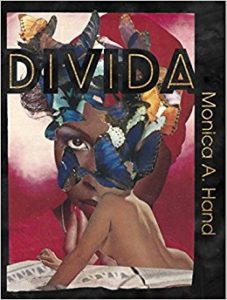
Monica A. Hand, DiVida
(Alice James Books, April 17)
Published posthumously, DiVida is the final collection from Monica A. Hand, who passed away in December 2016. In order to explore what it means to be black in America, Hand adopts two personas: DiVida, who believes assimilation is the only path to survival, and Sapphire, who refuses to sacrifice her self-actualization, no matter the cost. Hand’s writing imbues powerful verses with a surprising amount of tenderness. Her poems crack open the everyday experience to reveal both its inner beauty and hidden darkness.
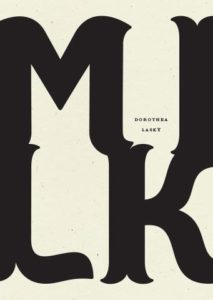
Dorothea Lasky, Milk
(Wave Books, April 3)
In Milk, Dorothea Lasky channels her electric writing into an examination of creativity and motherhood. In parts a critique and in others a celebration, Milk deftly navigates the complex relation between creator and creation, from poetry and new language to motherhood and new life. Lasky has a keen eye for the balance between the personal and universal. Milk has the intimacy of a memoir and the poignancy of a sacred text. This is her fifth full-length collection, in addition to nearly a dozen chapbooks that she has authored, and her experience shows. Milk is what happens when a writer is comfortable enough with their work to carve into the most terrifying and enigmatic parts of the human experience.
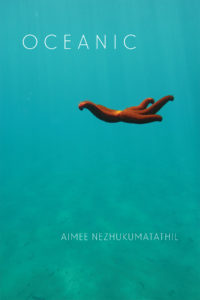
Aimee Nezhukumatathil, Oceanic
(Copper Canyon Press, April 10)
It’s a well-known adage that you shouldn’t judge a book by its cover, but feel free to make an exception for Oceanic: its beautiful design and vivid hues are matched by the lush, imaginative verse inside. Nezhukumatathil’s writing is perfect for readers with a voracious appetite and a burgeoning curiosity. Always inquisitive, Nezhukumatathil studies forms of love ranging across borders and life forms, turning his gaze from a father penguin to a C-section scar to the thundering of Niagara Falls. Oceanic sings the praises of the earth and its peoples, and of the ways in which we come together as one.
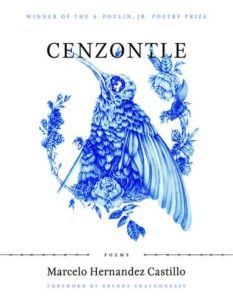
Marcelo Hernandez Castillo, Cenzontle
(BOA Editions, April 10)
With its lyrical imagery that will be dancing around your head for days afterwards, it’s hard to believe Cenzontle is Marcelo Hernandez Castillo’s debut. Castillo weaves a nuanced narrative of his life as a queer undocumented immigrant in a heteronormative marriage, navigating the intersections of his identity in a universal search for belonging. Cenzontle follows Castillo’s journey before, during, and after crossing the US/Mexico border and revels in all of the ways two people can come together in love, mourning, and hope. Castillo knows that art can change the world; he cofounded the Undocupoets campaign, which successfully eliminated citizenship requirements from all major first poetry book prizes in the country.
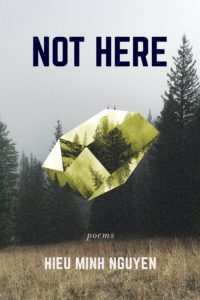
Hieu Minh Nguyen, Not Here
(Coffee House Press, April 10)
If you’re a fan of slam poetry, you’ve probably seen some of Hieu Minh Nguyen’s powerfully lyrical verse on Button Poetry. Perhaps you’ve seen his work in New York Times Magazine or on PBS’s News Hour. Nguyen is a writer whose talent, charisma, and intelligent work have him primed to become one of the most celebrated poets of our generation. In Not Here, Nguyen untangles whiteness, trauma, family, and nostalgia through the beating heart of his experiences as a queer Vietnamese American. His work is painfully beautiful, at once fraught and hopeful, and always pulling at the axes of desire.

Kai Carlson-Wee, Rail
(BOA Editions, April 24)
Kai Carlson-Wee’s first collection Rail brings the reader to a landscape of rail yards and skate parks, where transition is a verb and a noun at once and brotherhood can be both the source of survival and destruction. Carlson-Wee’s writing is tactile and immersive. His evocative description drags your fingertips through the dirt and makes you squint into the sunset. Rail is described as “a verse novella in documentary form,” but rather than using poetry to show you his own path, Carlson-Wee takes you along on the journey.
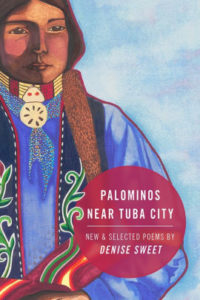
Denise Sweet, Palominos Near Tuba City
(Holy Cow! Press, April 24)
Anishinaabe poet Denise Sweet has a long resume that spans a career as an academic (as a professor of Humanistic Studies, Creative Writing, and First Nations Studies at the University of Wisconsin-Green Bay), a performer, and a writer, and she served as Wisconsin’s Poet Laureate from 2004–2008. Palominos Near Tuba City combines a selection of Sweet’s most beloved poems with new works. Her poems dig their roots into the past, using history and memory to push new shoots up for the future. Sweet’s writing is visceral, tangible, audible; it immerses the reader’s every sense in startling imagery. The poems in Palominos Near Tuba City are penned with a light touch that alternates easily between serious wisdom and gentle humor.
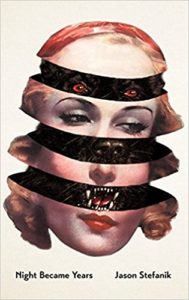
Jason Stefanik, Night Became Years
(Coach House Books, April 24)
Jason Stefanik’s Night Became Years is a stroll through identity and culture gives the reader plenty to muse on with every sentence. Drawing from Elizabethan canting language—a vernacular developed by thieves and beggars in the 15th century—Stefanik explores what it means to have a mixed heritage of indigenous and settler blood in the politically charged North End of Winnipeg, Canada. Though the topics of each poem in Night Became Years are wide-ranging, covering everything from alchemy to Protestant witch judges and football taunts, they come together seamlessly into a wider discussion of ownership, inheritance, and the possibilities of poetry today.
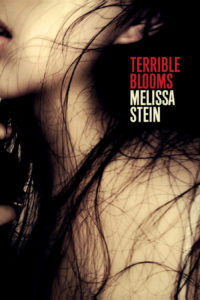
Melissa Stein, Terrible Blooms
(Copper Canyon Press, April 17)
In Melissa Stein’s second collection, she turns conventional notions of femininity on their head, mingling images of violence and beauty until they can no longer be extricated from each other. Terrible Blooms is at once a battle cry and a gentle reclamation. One of Stein’s many strengths lies in her empathy, and the ways in which she uses persona and lyric richness to build worlds that are at once foreign and all-too-familiar. The New York Times said it best in a review of her first book: “Ms. Stein reminds us that there is no honey—rough, or otherwise—without the sting.”
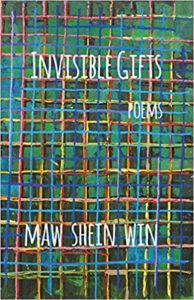
Maw Shein Win, Invisible Gifts
(Manic D Press, May 15)
This one technically doesn’t come out until May, but we couldn’t resist slipping it in. Maw Shein Win’s poetry is full of redefinitions and redistributions, of recollections that take on new perspectives and fracture into possibilities for the reader to follow. In Invisible Gifts, Win reflects on family, art, and loss to chip away at what it means to be both powerful and vulnerable at the same time. Her writing is full of paradoxes as as colorful as the book’s cover. This is Win’s first full-length collection, following two chapbooks and impressively diverse accolades such as having her poetry featured in artist Megan Wilson’s mural, Flower Interruption, a featured piece at San Francisco’s Asian Art Museum.
Cassidy Foust
Cassidy Foust is a writer, reader, and coffee-drinker from the Twin Cities. She has a B.A. in Creative Writing from Macalester College and her work has been featured on Button Poetry.



















